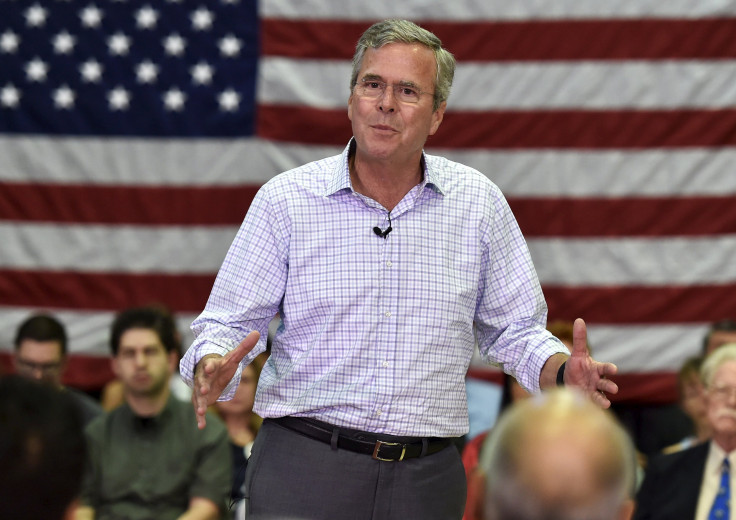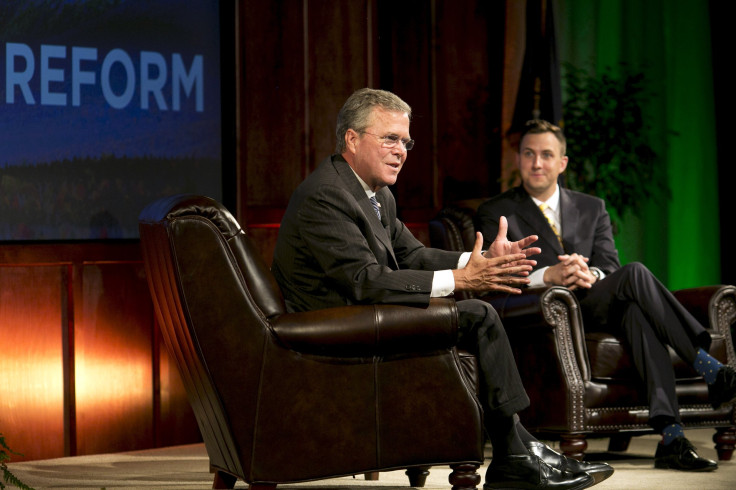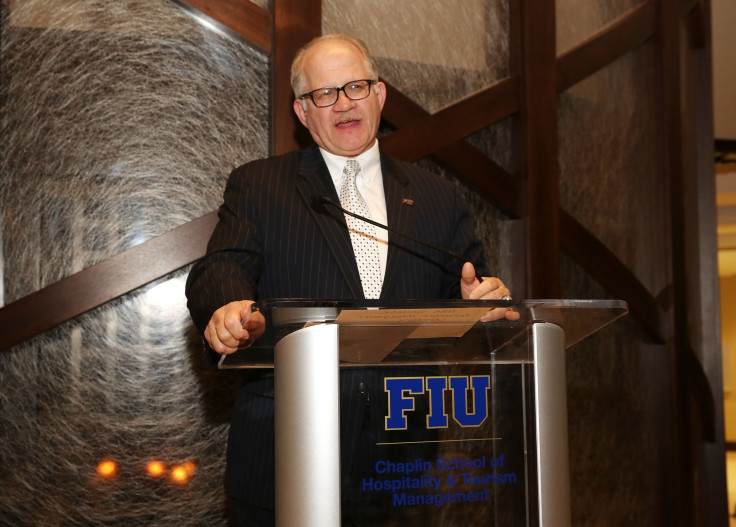Election 2016: Jeb Bush Leveraged Political Connections For Clients And Allies After Leaving Florida Governorship, Emails Show

Four years out of office, Jeb Bush was acting as a paid consultant to a for-profit education company that makes its money helping universities offer online classes. Seeking to grow the business, the former Florida governor emailed an old associate who was now the president of Florida International University, a public university that was already paying Bush’s firm to operate its Internet-based MBA program.
The profitability of his firm’s arrangement with the taxpayer-funded school “warms my heart,” Bush wrote to FIU president Mark Rosenberg in 2011. “How can we expand the relationship to other degree programs?”
“Thanks, governor!” Rosenberg replied, saying the university was interested in giving more business to Bush’s firm, Academic Partnerships. After he and Bush traded more emails, FIU announced a deal to expand its agreement with the company. The relationship has been lucrative for Bush's firm: It has made almost $20 million from FIU, according to the school.
To listen to Bush’s speeches now is to hear a fervent enemy of lobbyists. As he pursues the Republican presidential nomination, he has repeatedly expressed disdain for people who worked inside government and then exploited those connections for their own material gain.
“One thing I didn’t do was get paid to lobby or cut deals with the state government I just left,” Bush said in a statement in June. “That was a line I drew, and it was the right one.”
He has proposed new ethics reforms to discourage outgoing lawmakers from entering the influence-peddling industry, and urged tighter registration rules to cover “the ambiguous class of consultants who lobby but call it something else.”
But eight years’ worth of Bush’s emails with his former colleagues and employees in state government portray a former public official hard at work utilizing the relationships he had made in office. For the benefit of clients, friends and allies, he leveraged his political connections to shape outcomes on everything from online education to insurance regulation, from disaster management to a proposed bike trail near a golf course where Bush’s father and brother were members.
The emails between Bush and state employees are warm and often personal, featuring chats about families, birthdays, job changes and memories of his time in office. Many of the officials in the emails owed their government jobs to Bush, either directly or via Bush’s own appointees.
Now, executives at some of the firms he assisted are financially supporting his bid for president.
The approximately 600 emails were obtained by International Business Times through public records requests to 11 state agencies and 2 public universities.
Stephen Spaulding of the liberal group Common Cause said the emails show that “Jeb Bush profited as a consultant using his contacts soon after his term as Florida governor ended.” That revelation, Spaulding said, gives new context to Bush’s recent proposal to restrict lawmakers’ lobbying activity immediately after they leave office.
"On the one hand, it is exactly the kind of reform voters want to see,” he said of Bush’s ethics recommendations. “On the other hand, it is the type of hypocrisy that drives voters crazy. Any good Bush's proposal created for him is now washed away by his own actions."
Bush’s campaign spokesperson Kristy Campbell, in a statement to IBTimes, defended the former governor’s ethics record and success in the private sector.
“After eight successful years of conservative accomplishments as governor of Florida, Gov. Bush returned to the private sector where he built a successful family business,” Campbell said. “In an unprecedented public display of transparency, he released 33 years of tax returns and 280,000 emails from his time in office. Gov. Bush has never been a lobbyist or traded favors with anyone.”
While Bush did not register as a lobbyist after leaving the governorship, emails show he often served as a bridge between companies and public officials, facilitating introductions and setting up meetings.
Because some emails show Bush urging policymakers to take action on behalf of companies, several ethics experts and Florida lobbyists told IBTimes that Bush’s communications appear to be a clear form of lobbying.
However, Florida ethics rules require someone to register as a lobbyist only if the person is “principally employed” by a company for the purpose of “overseeing the employer's various relationships with government or representing the employer in its contacts with government.”

Job descriptions notwithstanding, it is abundantly clear that in the years after he left office, Bush profited immensely at the intersection of business and government.
The former governor earned $29 million by 2013, according to tax returns released by his campaign. Some of that income was derived from his work with various corporations and nonprofits that had business with the state. That included serving as a board member for a timber firm that did land deals with his administration and a hospital conglomerate that receives state Medicaid business.
Bush also started a number of companies, the most lucrative of which was a consulting firm he founded with his son, Jeb Bush & Associates. The firm pulled in $33 million between 2007 and 2013, according to the Washington Post. More than a third of that money, $12 million, was paid by financial firms Barclays and Lehman Brothers, both of which had managed Florida pension money during Bush’s time as governor. Another $8 million resulted from speaking fees paid to Bush by corporations.
The rest of the money -- roughly $13 million -- came from consulting clients, which included Academic Partnerships. Bush’s campaign has not released a full list of the firm’s clients, making it impossible to verify whether Bush was paid by any of the other companies that he discussed with state officials.
'Did The Academic Partnership People Come See You?'
In the case of Academic Partnerships -- where Bush was paid a $60,000 salary and owned an undisclosed amount of stock -- he was involved in forging transactions with the Florida government and regularly conversed with officials from two state universities, FIU and the University of West Florida.
Bush’s relationship with the for-profit venture (it takes a cut of students’ tuition in exchange for helping universities offer online degrees) began during the latter half of his second term, when education entrepreneur Randy Best approached him about going into the business, according to the New Yorker. Though one of Best’s firms was cited in a critical inspector general report about favoritism in federal education contracting, Bush forged ties with the company.
Within months of leaving Tallahassee in 2007, Bush was paid for giving a speech by Best’s firm, Best Associates, which launched the company that would later become Academic Partnerships.
Best -- a George W. Bush fundraiser who has contributed $100,000 to Jeb Bush’s presidential super PAC -- quickly benefited from Bush’s outreach to Florida officials. FIU’s provost told the Miami Herald that Bush introduced Academic Partnerships to then-university President Modesto “Mitch” Maidique in the lead up to the school’s first deal with with the firm in 2009. Within two years, Bush had been paid by Best for another speech and become an investor in Academic Partnerships as well as a paid consultant to the company.
Academic Partnerships does not have any registered lobbyists in Florida. But emails show Bush pressed former colleagues for new business with the company.
In February of that year, for instance, Bush received an email from University of West Florida (UWF) lobbyist Janice Gilley wishing him a happy birthday. In response to Gilley -- who had served as Bush’s gubernatorial policy adviser -- Bush brought up his firm.
“Did the Academic Partnership people come see you?” Bush asked, to which Gilley replied: “We are meeting with them this coming Thursday. Our folks are looking forward to the visit. I truly hope we can work together.”
Three months later, UWF signed a contract with Academic Partnerships that gave the firm 50 percent of the tuition from students who used the service. The contract has paid the company nearly $5 million of student tuition money, according to university documents obtained by IBTimes.
Bush built on those efforts. In October 2011, he headlined an Academic Partnerships-sponsored conference in Dallas promoting the company’s services to more than 200 public university officials from across the country. He also continued pressing Florida International University’s Rosenberg to expand its partnership with the firm, periodically checking in with the university president about meetings between school staff and company officials.

Florida Ethics Commission spokesperson Carrie Stillman told IBTimes that the state’s lobbying rules apply to public universities.
As Bush became one of the public faces of the company -- appearing in the firm’s promotional videos and publishing op-eds with Best -- FIU announced an expansion deal in 2013. While FIU officials said Academic Partnerships had proven its worth, faculty at schools in other states had raised questions about the effectiveness of the firm’s education programs. Some professors at FIU questioned the new agreement, asking why the contracts with Academic Partnerships had not been competitively bid.
"I'm very concerned with FIU Global and our relationship with Academic Partnerships," one professor told Rosenberg at a faculty meeting, according to the Miami Herald. "It seems like political pressure is being put on FIU to do this thing."
The proposed expansion deal was never finalized, according to Academic Partnerships. A company spokesperson, Richard Weber, said in a statement: "Academic Partnerships did provide a proposal for FIU to explore a globally-focused initiative, but a contract for that program was never pursued.”
A month after the Herald's report, Gilley emailed Bush with an update, telling him that UWF was working “well with Academic Partnerships, and we are hoping to contract with them” for a new statewide online degree program. “I have been chatting Randy Best up to the senate president’s office,” she told Bush. Bush told Gilley that he believed Best planned to meet with the legislator “sometime soon.”
A few months later, Gilley emailed Bush again, telling him: “Thought you might find it funny that I am having dinner at Randy Best's home this evening in Dallas. I doubt I have a belt buckle large enough for the event.” She added: “We are having conversations with [Academic Partnerships] on the expansion of our partnership.” Bush replied: “Say hey to Randy. Your buckle is big enough!”
Six months later, UWF signed a new deal with Academic Partnerships to expand its online degree program.
FIU, Gilley and Academic Partnerships did not respond to IBTimes' questions.
'I Have No Interest In This'
Other Bush emails show him trying to arrange a meeting between the secretary of Florida’s Department of Environmental Protection (DEP) and Seacor, a disaster response company with whom the former governor later formalized a business relationship.
In the summer of 2010, as Florida tried to contain the damage from BP’s oil spill in the Gulf of Mexico, Bush wrote to DEP Chief Mike Sole requesting he meet with Eric Fabrikant, a top executive at Seacor. Sole had served in Bush’s gubernatorial administration.
Seacor, headquartered in Fort Lauderdale, Florida, already had a significant stake in the Gulf cleanup efforts. A Seacor subsidiary, O’Brien’s Response Management, was serving as an emergency response consultant for BP.
“They are very active in cleanup activities in the Gulf and would like to brief you on those activities,” Bush wrote of Seacor. “I have no interest in this other than to help the state and connect you two.”
“Governor, I will follow up with Eric first thing tomorrow,” Sole replied.
One year later, Bush would indeed have a financial interest in Seacor. In September 2011, Bush and Seacor announced a strategic partnership between its subsidiary, O’Brien’s, and a company Bush had recently created, Old Rhodes Holdings. The partnership, according to a press release, was meant to "facilitate O’Brien’s growth into new markets.” Bush’s tax returns show that he was paid $366,000 by Old Rhodes Holdings.
Both Seacor and the DEP say they are not aware of any meetings between the company and agency officials. Dee Ann Miller, a spokesperson for the DEP, said the agency has not entered into any contracts with the company or O’Brien’s following Bush’s email. Since 2011, O'Brien's has won at least a dozen contracts from counties and cities across Florida.
In January, Seacor CEO Charles Fabrikant contributed $15,000 to the super PAC backing Bush’s campaign for president, according to campaign finance records.
'As Per Jeb Bush'
One email chain shows the former governor trying to influence the enforcement of state insurance rules. In the summer of 2011, Bush pushed the Florida Office of Insurance Regulation to approve an insurance scheme being offered by a company called In The Car. That firm was partnering with General Motors and MetLife to offer a free year of insurance with the purchase of a new automobile.
In The Car’s most prominent booster and investor was Dick Fuld, the former CEO of Lehman Brothers, according to Fox Business News. Bush worked for Lehman Brothers shortly after he left the governor’s mansion. His employment at the bank was controversial -- the firm’s collapse cost Florida taxpayers an estimated $1 billion.
At the time of Bush’s outreach, General Motors and MetLife were running a pilot project with In The Car in Oregon and Washington state, and there were plans to expand the program nationwide. But in Florida, a regulator demanded that MetLife revise its program to conform with a state rule prohibiting companies from offering free insurance as a way to persuade customers to buy a product.
On Aug. 8, 2011, Bush spoke with the regulator’s boss, Florida Insurance Commissioner Kevin McCarty, who was appointed to that position by Bush and some of Florida’s other elected state officials. The next day, Bush’s assistant sent a document to McCarty in an email with the subject line: “As per Jeb Bush, based on conversation with him yesterday.” The document was a legal brief from MetLife to McCarty’s staffer seeking approval for the insurance initiative.
Bush’s campaign did not answer IBTimes’ questions about whom he was helping or whether he was paid. Robert Wallach, the former head of In The Car, told IBTimes that his company requested Bush’s help with Florida officials, but Bush declined.
A spokesperson for MetLife said the company never employed Bush nor asked him to reach out to Florida regulators. The company’s CEO, Steve Kandarian, has given $15,000 to the super PAC supporting Bush’s presidential bid.
Though Bush pressed his administration’s former appointee to approve the deal, the effort was not successful: Two weeks after his outreach to McCarty, the Office of Insurance Regulation rejected the program in a letter sent directly to Bush’s consulting firm. In The Car’s free insurance plan failed months later, after its partnership with General Motors ended.
'Would You Be Interested In Meeting'
One mysterious set of emails was between Bush and Florida’s Public Service Commission, which regulates the state’s energy and telecommunications firms.
In the years before he and his sons became energy investors, Bush reached out to Lisa Polak Edgar, who was appointed to the commission by Bush. In a 2007 email to Edgar, he wrote: “I would love to talk to you to get a sense of the new strategy for energy capacity buildup. Can I call you?” Edgar agreed, saying, “I look forward to talking at your convenience.”
In 2009, Bush sent a message to Matt Carter, who was, at the time, the commission’s chairman: “Any news on our conversation?” Carter was also appointed to the commission by Bush. A Public Service Commission official said the commission does not have any more information related to the email.
In a January 2013 email, Bush sought to arrange a meeting with Tony Bennett, the Florida education commissioner, for Steve Uhlfelder. A former Bush education appointee, Uhlfelder wanted Bennett to get involved with the Florida Mentoring Partnership, which Bush had created as governor to help provide children with role models.
At the time, Uhlfelder was working as a lobbyist for Pearson, a for-profit publishing company with substantial government contracts. Pearson has been a major donor to a nonprofit education organization Bush created after leaving office, and Bush’s group has advocated for education standards that have benefited Pearson. Uhlfelder told IBTimes that since Bush left office, the former governor’s education group “has played a very active, positive role in state government.”
Six months after Bush’s introduction, Bennett announced the Florida Department of Education would be working with Uhlfelder’s group to recruit hundreds of new mentors for students in Tallahassee. Campaign finance records show that Uhlfelder’s lobbying firm has given $5,000 to Bush’s super PAC.
Emails also show Bush had meetings with officials at two economic development agencies -- one that authorizes tax incentives for companies, another that specifically helps aerospace firms secure project financing.
The location of a bike path drew the ex-governor's attention as well. In 2010, Bush passed along a concerned letter from a golf company to the Florida Department of Transportation about a proposed bike trail near its golf course in Southwest Florida.
“I was asked to email this to you. It is self explanatory,” Bush wrote as he forwarded the message about the golf course, Coral Creek Club. Bush’s brother and father are members there, and the former governor and his family golfed at the club later that year with its president and House Speaker John Boehner.
A spokesperson for the Department of Transportation said that staffers did alter construction plans but did not say what prompted the shift.

Last fall, just months before Bush resigned from most of his business interests in preparation for a presidential run, the former governor sought to arrange a meeting between FIU’s president Rosenberg and officials at Uniesp, a Brazilian university, to discuss a potential joint venture. Bush informed Rosenberg that he and his son were "working with Uniesp.”
“They are coming to the United States between Sept. 20-28,” Bush said. “Would you be interested in meeting either at the beginning or end of that timeframe?”
UPDATE 8/18/15 6:55PM:
This story initially said that "FIU signed a deal to expand its agreement" with Academic Partnerships. That expansion deal was never finalized, according to a statement provided by Academic Partnerships after press time.
© Copyright IBTimes 2024. All rights reserved.






















